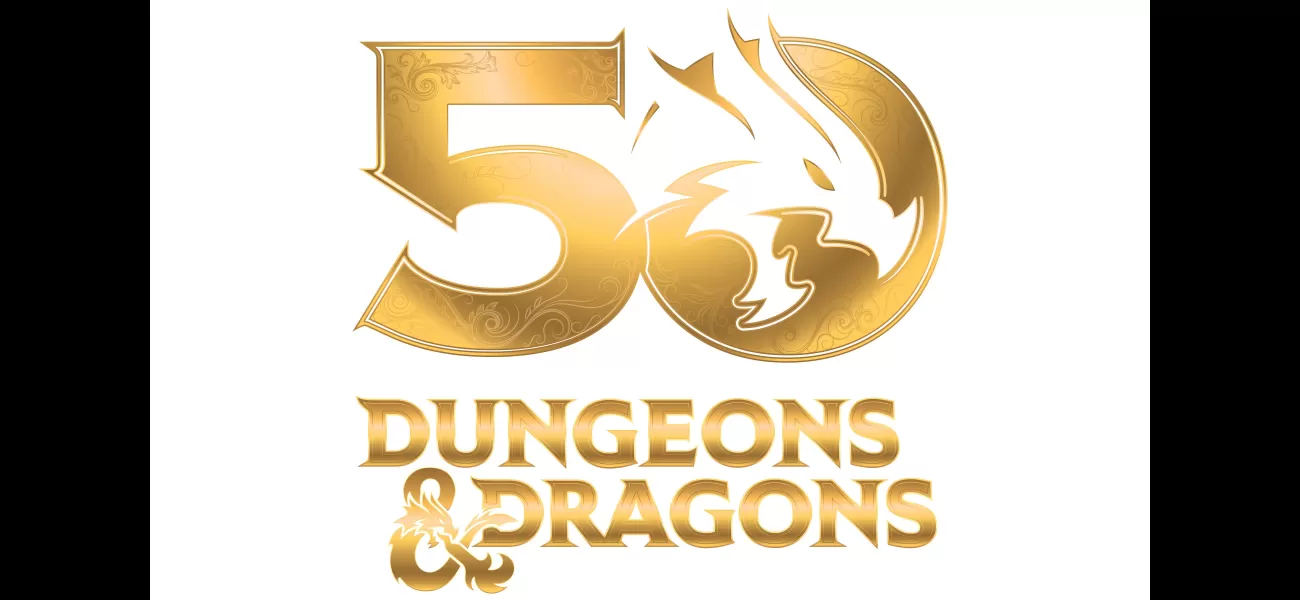Celebrating 50 years of Dungeons & Dragons and reflecting on the author's personal experiences with the iconic game.
GameCentral reflects on 50 years of classic role-playing as the birthplace of interactive entertainment reaches its milestone anniversary.
February 15th 2024.

As we approach the 50th anniversary of Dungeons & Dragons, the iconic tabletop role-playing game, I can't help but reflect on the past five decades of my own journey with it. It all began during my school summer holidays in Scotland when I was introduced to Middle-Earth Role Playing, a game that was considered quite unusual for a 12-year-old girl at the time. But now, you are more likely to find me at Mutant Freaks D&D club in Elephant and Castle or enjoying a casual night of campaigning at Bad Moon Café.
Since its inception in the 1980s, the world of tabletop gaming has expanded exponentially, but one game has stood the test of time and become a cultural phenomenon: Dungeons & Dragons. With its recent appearances in popular shows like Stranger Things and a new movie adaptation, the game has become more mainstream than ever before.
What sets Dungeons & Dragons apart is its unique blend of storytelling, teamwork, and inclusive creativity. In a world where we are constantly consuming passive entertainment, D&D offers a refreshing change by immersing players in a collaborative storytelling experience. It's not just about watching, but actively participating and creating characters that represent a diverse range of voices and perspectives.
Thanks to streaming platforms and social media, D&D has reached a wider audience than ever before. Celebrities and influencers, such as the popular show Critical Role and the UK Kickstarter Natural Six, have helped to demystify the game and make it more accessible to all. And let's be honest, who wouldn't want to step into the Forbidden Realms alongside their favorite celebrities?
Dungeons & Dragons also offers a much-needed escape from the chaos of the real world. It's a place where you can embark on epic adventures with friends or even strangers who may become lifelong companions. There's nothing quite like fighting off a horde of Kobolds in the basement of a South London pub to bond with others. This rise in tabletop gaming speaks volumes about society's desire for meaningful connections and immersive, physical experiences.
Video games have also been heavily influenced by Dungeons & Dragons, with some of the earliest games being directly inspired by it. I still remember playing ASCII MUDs on my dad's university network in the 1980s, where the influence of D&D on video games first emerged with the release of Colossal Cave Adventure. This text-based adventure game, created by Will Crowther and Don Woods, laid the foundation for future role-playing games and sparked my own interest in video game design.
Fast forward to the 1980s and 1990s, and the impact of D&D on computer role-playing games is undeniable. Games like Ultima and Wizardry drew direct inspiration from D&D's mechanics, introducing a new generation of gamers to the joys of digital role-playing. And with the recent release of Baldur's Gate 3, we can see that D&D continues to be a guiding light for the video game industry.
As we celebrate 50 years of fantasy role-playing, publisher Wizards of the Coast is preparing a year-long celebration for fans worldwide. From revisiting classic adventures to unveiling new rulebooks, this will be an exciting journey for old and new fans alike. And for those who may still view D&D as nerdy and unfashionable, the game's popularity and influence on other media prove otherwise.
The festivities are set to kick off this March with a shared adventure called Descent Into The Lost Caverns Of Tsojcanth. This short campaign, written by D&D co-creator Gary Gygax, was first released in 1982 and has been updated to celebrate the game's milestone anniversary. So whether you're a seasoned player or new to the world of Dungeons & Dragons, there's never been a better time to join in on the adventure.
For fifty years, Dungeons & Dragons has been the epicenter of interactive entertainment, captivating players with its immersive role-playing experience. As the game approaches its golden jubilee in March 2024, it's hard not to look back on the past five decades of old school role-playing with nostalgia and fondness.
My first encounter with tabletop role-playing was during my school summer holidays in Scotland, when I stumbled upon Middle-Earth Role Playing. Back then, it was considered an unusual hobby for a 12-year-old girl, but now, you're more likely to find me and a diverse group of adventurers at the Mutant Freaks D&D club in Elephant and Castle, or enjoying a casual night of campaigning at Bad Moon Café.
In the '80s, the world of tabletop gaming expanded and diversified, but one phenomenon stood out above all: Dungeons & Dragons. With its recent feature in Stranger Things and a new theatrical movie adaptation titled Dungeons & Dragons: Honor Among Thieves, the once niche nerdy hobby has become a cultural juggernaut. And its popularity has never been higher.
At its core, D&D offers a unique blend of storytelling, camaraderie, and inclusive creativity. In a world where binge-watching and passive entertainment dominate, D&D stands out as a beacon of imagination, bringing people together in a collaborative storytelling experience. Players aren't just spectators; they are active participants, shaping narratives and embodying characters of their own creation, often with representation that is not seen elsewhere.
In recent years, D&D has exploded into the mainstream, thanks to the rise of streaming platforms and social media. High-profile celebrities and influencers, such as US-based Critical Role and UK-based Kickstarter Natural Six, have broadcast their campaigns to millions, making the game more accessible to a broader audience. The allure of experiencing the Forbidden Realms through the eyes of your favorite celebrities has become irresistible, drawing in both newcomers and veteran players alike.
Dungeons & Dragons offers a much-needed escape from the real world, a refuge where you can temporarily leave behind the chaos and embark on epic adventures with friends or even strangers who will become friends. There's nothing quite like fighting off a horde of Kobolds to bond with others in the cold basement of a South London pub. The rise of tabletop gaming speaks volumes about society's craving for meaningful connections and immersive, physical experiences.
Last year, we saw what many consider to be the most faithful video game adaptation of D&D yet, with Baldur's Gate 3. Video games have been trying to recreate the essence of D&D for decades, both officially and unofficially, with some of the earliest video games being directly influenced by it. In fact, it's almost impossible to imagine modern video games without the impact of tabletop games.
I was fortunate enough to play ASCII MUDs on my dad's university network in the 1980s. The earliest manifestations of D&D's influence on video games emerged on university networks, with the release of Colossal Cave Adventure in 1976. This text-based adventure game, created by Will Crowther and refined by Don Woods, transported players into a subterranean realm filled with puzzles, treasures, and dangerous encounters. Its maze-like structure and emphasis on exploration mirrored the dungeon-crawling essence of D&D, laying the foundation for future role-playing games... and my short-lived career in video games.
In the 1980s and 1990s, during the golden age of computer role-playing games, D&D's influence on the genre was unmistakable. Titles like Ultima and Wizardry drew direct inspiration from D&D's mechanics, incorporating character attributes, turn-based combat, and branching narratives into their gameplay. These games not only paid homage to their tabletop predecessor but also introduced a generation of gamers to the joys of digital role-playing.
As Baldur's Gate 3 has proven, D&D continues to be a guiding light for the video game industry, illuminating the path for designers and players alike. As I let my new Scratch tattoo heal, I can't help but feel grateful that the next generation of gamers no longer sees D&D as nerdy and unfashionable, as previous generations did. The game and its settings have once again become something that other games and media are eager to emulate.
As the sometimes controversial stewards of this legacy of imagination, publisher Wizards of the Coast is preparing to celebrate D&D's 50th anniversary with events throughout the year. According to Kyle Brink, executive producer of the Wizards of the Coast D&D team, "As we commemorate the 50th anniversary, we're not just celebrating the past, but embracing the present and shaping the future. From revisiting classic adventures to unveiling new core rulebooks, this year promises to be an exciting journey for both old and new fans."
The festivities will kick off this March, with fans from all over the world invited to join in a shared adventure inspired by the game's tournament-style roots. Titled Descent Into The Lost Caverns Of Tsojcanth, this super short campaign was first released in 1982 and written by D&D co-creator Gary Gygax. It has been specially updated to celebrate the 50th anniversary of the game and will be one of many short one-shot adventures available to play at gaming shops and cafes everywhere.
Since its inception in the 1980s, the world of tabletop gaming has expanded exponentially, but one game has stood the test of time and become a cultural phenomenon: Dungeons & Dragons. With its recent appearances in popular shows like Stranger Things and a new movie adaptation, the game has become more mainstream than ever before.
What sets Dungeons & Dragons apart is its unique blend of storytelling, teamwork, and inclusive creativity. In a world where we are constantly consuming passive entertainment, D&D offers a refreshing change by immersing players in a collaborative storytelling experience. It's not just about watching, but actively participating and creating characters that represent a diverse range of voices and perspectives.
Thanks to streaming platforms and social media, D&D has reached a wider audience than ever before. Celebrities and influencers, such as the popular show Critical Role and the UK Kickstarter Natural Six, have helped to demystify the game and make it more accessible to all. And let's be honest, who wouldn't want to step into the Forbidden Realms alongside their favorite celebrities?
Dungeons & Dragons also offers a much-needed escape from the chaos of the real world. It's a place where you can embark on epic adventures with friends or even strangers who may become lifelong companions. There's nothing quite like fighting off a horde of Kobolds in the basement of a South London pub to bond with others. This rise in tabletop gaming speaks volumes about society's desire for meaningful connections and immersive, physical experiences.
Video games have also been heavily influenced by Dungeons & Dragons, with some of the earliest games being directly inspired by it. I still remember playing ASCII MUDs on my dad's university network in the 1980s, where the influence of D&D on video games first emerged with the release of Colossal Cave Adventure. This text-based adventure game, created by Will Crowther and Don Woods, laid the foundation for future role-playing games and sparked my own interest in video game design.
Fast forward to the 1980s and 1990s, and the impact of D&D on computer role-playing games is undeniable. Games like Ultima and Wizardry drew direct inspiration from D&D's mechanics, introducing a new generation of gamers to the joys of digital role-playing. And with the recent release of Baldur's Gate 3, we can see that D&D continues to be a guiding light for the video game industry.
As we celebrate 50 years of fantasy role-playing, publisher Wizards of the Coast is preparing a year-long celebration for fans worldwide. From revisiting classic adventures to unveiling new rulebooks, this will be an exciting journey for old and new fans alike. And for those who may still view D&D as nerdy and unfashionable, the game's popularity and influence on other media prove otherwise.
The festivities are set to kick off this March with a shared adventure called Descent Into The Lost Caverns Of Tsojcanth. This short campaign, written by D&D co-creator Gary Gygax, was first released in 1982 and has been updated to celebrate the game's milestone anniversary. So whether you're a seasoned player or new to the world of Dungeons & Dragons, there's never been a better time to join in on the adventure.
For fifty years, Dungeons & Dragons has been the epicenter of interactive entertainment, captivating players with its immersive role-playing experience. As the game approaches its golden jubilee in March 2024, it's hard not to look back on the past five decades of old school role-playing with nostalgia and fondness.
My first encounter with tabletop role-playing was during my school summer holidays in Scotland, when I stumbled upon Middle-Earth Role Playing. Back then, it was considered an unusual hobby for a 12-year-old girl, but now, you're more likely to find me and a diverse group of adventurers at the Mutant Freaks D&D club in Elephant and Castle, or enjoying a casual night of campaigning at Bad Moon Café.
In the '80s, the world of tabletop gaming expanded and diversified, but one phenomenon stood out above all: Dungeons & Dragons. With its recent feature in Stranger Things and a new theatrical movie adaptation titled Dungeons & Dragons: Honor Among Thieves, the once niche nerdy hobby has become a cultural juggernaut. And its popularity has never been higher.
At its core, D&D offers a unique blend of storytelling, camaraderie, and inclusive creativity. In a world where binge-watching and passive entertainment dominate, D&D stands out as a beacon of imagination, bringing people together in a collaborative storytelling experience. Players aren't just spectators; they are active participants, shaping narratives and embodying characters of their own creation, often with representation that is not seen elsewhere.
In recent years, D&D has exploded into the mainstream, thanks to the rise of streaming platforms and social media. High-profile celebrities and influencers, such as US-based Critical Role and UK-based Kickstarter Natural Six, have broadcast their campaigns to millions, making the game more accessible to a broader audience. The allure of experiencing the Forbidden Realms through the eyes of your favorite celebrities has become irresistible, drawing in both newcomers and veteran players alike.
Dungeons & Dragons offers a much-needed escape from the real world, a refuge where you can temporarily leave behind the chaos and embark on epic adventures with friends or even strangers who will become friends. There's nothing quite like fighting off a horde of Kobolds to bond with others in the cold basement of a South London pub. The rise of tabletop gaming speaks volumes about society's craving for meaningful connections and immersive, physical experiences.
Last year, we saw what many consider to be the most faithful video game adaptation of D&D yet, with Baldur's Gate 3. Video games have been trying to recreate the essence of D&D for decades, both officially and unofficially, with some of the earliest video games being directly influenced by it. In fact, it's almost impossible to imagine modern video games without the impact of tabletop games.
I was fortunate enough to play ASCII MUDs on my dad's university network in the 1980s. The earliest manifestations of D&D's influence on video games emerged on university networks, with the release of Colossal Cave Adventure in 1976. This text-based adventure game, created by Will Crowther and refined by Don Woods, transported players into a subterranean realm filled with puzzles, treasures, and dangerous encounters. Its maze-like structure and emphasis on exploration mirrored the dungeon-crawling essence of D&D, laying the foundation for future role-playing games... and my short-lived career in video games.
In the 1980s and 1990s, during the golden age of computer role-playing games, D&D's influence on the genre was unmistakable. Titles like Ultima and Wizardry drew direct inspiration from D&D's mechanics, incorporating character attributes, turn-based combat, and branching narratives into their gameplay. These games not only paid homage to their tabletop predecessor but also introduced a generation of gamers to the joys of digital role-playing.
As Baldur's Gate 3 has proven, D&D continues to be a guiding light for the video game industry, illuminating the path for designers and players alike. As I let my new Scratch tattoo heal, I can't help but feel grateful that the next generation of gamers no longer sees D&D as nerdy and unfashionable, as previous generations did. The game and its settings have once again become something that other games and media are eager to emulate.
As the sometimes controversial stewards of this legacy of imagination, publisher Wizards of the Coast is preparing to celebrate D&D's 50th anniversary with events throughout the year. According to Kyle Brink, executive producer of the Wizards of the Coast D&D team, "As we commemorate the 50th anniversary, we're not just celebrating the past, but embracing the present and shaping the future. From revisiting classic adventures to unveiling new core rulebooks, this year promises to be an exciting journey for both old and new fans."
The festivities will kick off this March, with fans from all over the world invited to join in a shared adventure inspired by the game's tournament-style roots. Titled Descent Into The Lost Caverns Of Tsojcanth, this super short campaign was first released in 1982 and written by D&D co-creator Gary Gygax. It has been specially updated to celebrate the 50th anniversary of the game and will be one of many short one-shot adventures available to play at gaming shops and cafes everywhere.
[This article has been trending online recently and has been generated with AI. Your feed is customized.]
[Generative AI is experimental.]
0
0
Submit Comment





